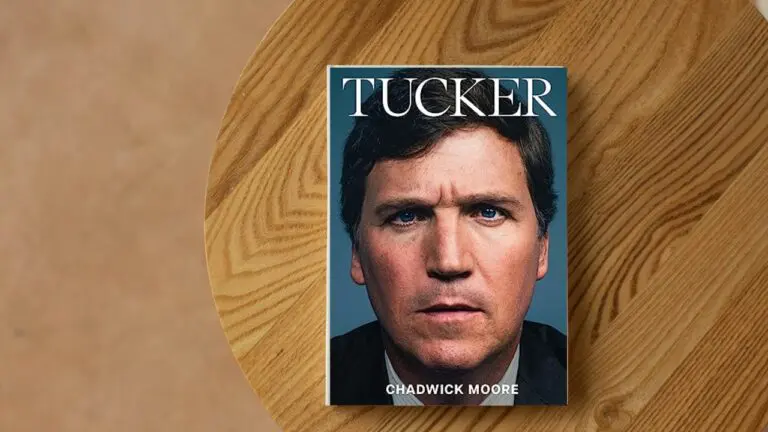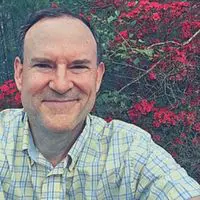
Tucker is Chadwick Moore’s fascinating and highly readable new biography of the most consequential conservative populist media icon since talk radio king Rush Limbaugh. For the last several years on his top-rated FOX TV show, fifty-four-year-old Tucker Carlson has been the leading voice of traditional Americans appalled at the recent leftist establishment assault on their entire culture. Indeed, Moore asserts that Carlson “shared our horror and confusion about what was happening to the country we love and articulated it as no one else could, or dared to.” Yet, despite decrying such disturbing developments, “his fierce independence of mind was always exhilarating. We knew we weren’t alone.” With generous access to Carlson, his wife, and his TV show staff, and considering that the long-time liberal gay author came out as conservative on Carlson’s program, it is not surprising that the book is strongly supportive of its subject.
As compelling as Tucker’s focus on the present-day Carlson is, its attention to his upbringing and youth is the most riveting aspect of his story for all the remarkable revelations that do not remotely fit the stereotype of a son of privilege. More importantly, Moore’s research offers insights to explain Carlson’s core characteristics.
His father was born illegitimate to a 15-year-old who gave him up for adoption not long before the young biological father committed suicide. Though Carlson’s dad became a successful TV news anchor and prominent Reagan administration appointee, Carlson’s mother was an alcoholic, drug-addled hippie who made her disdain for her son quite clear, abandoning him at six never to see him again, and willing him one dollar. The backdrop to this severe emotional abuse was the weirdness of 1970s southern California living next door to The Eagles rock band.
But instead of sentencing him to a lifetime of self-pitying therapy, being so disliked by his mother appears to have inured him to criticism, with Carlson confiding how “the lesson that I internalized from that was you really can’t control how other people feel. And, so, you have to just kind of be happy with who you are.” Being inured to assaults from all but those he loves and respects appears to have made him impervious to the recent attacks hurled at him by so much of the ruling class.
Perhaps another reason why “In a time of pussyfooting evasions, he speaks truths that almost no one else will, and does so in interesting, original, and, yes, often highly provocative ways” is because his father essentially let young Tucker do whatever he wanted, including driving at thirteen and hitchhiking at fourteen. This appears to have made Carlson quite comfortable courting risks that most of us would go to some lengths to avoid, like spending the bulk of his first summer in college tooling around Central America, especially Nicaragua, during that nation’s civil war where he wrote at La Prensa, the main newspaper opposing the communist Sandinista regime.
Making Carlson’s journalistic career and acclaimed TV monologues all the more noteworthy is that he is severely dyslexic, frequently skipped class growing up, and was largely a D student right up to when he dropped out of college. Tucker should have revealed how Carlson overcame his learning disability to become such a devoted reader and successful writer.
For someone who would so upset both establishment Democrats and Republicans, it is instructive that Carlson was never a conformist, preferring instead to be a largely self-educated iconoclast following his own “different drummer,” a la Thoreau. So, when his buddies pledged a fraternity, Carlson declined. Similarly, his top writing influence is quite possibly liberal, drug-loving Hunter S. Thompson. Nor will the conservative icon once famous for his bow ties use deodorant or wear socks, and his favorite musical group is the Grateful Dead.
Not surprisingly, Carlson left a quite a chemical trail of his own. He was a two-pack-a-day smoker until breaking into TV and becoming a nicotine gum-user ever since, with an occasional cigar. When young, he was rejected by the CIA because of its drug test, and he was a “functional alcoholic” who drank his way through college and had liquor for breakfast before becoming a teetotaler at 33.
Throughout his life, he has remained his father’s son by being an inveterate risk-taker, becoming a conservative, and pursuing a career in political journalism. Nevertheless, having grown used to dining with major politicians as a boy, Carlson has never been in awe of them. To the contrary, he is bored by most famous folks who he sees as entitled, dismissing them with the observation that “Most people get to a certain point of notoriety where they think, being with me is inherently entertainment enough. Wrong!”
But Carlson has wholesale contempt for the political class he covers, pronouncing how:
There are 435 members of the House of Representatives…. And some of them are fine, but overwhelmingly they are hollow people who are in the business because they yearnfor the affirmation of strangers, which is inherently sick. Who cares what strangers think of you? You should care what the people around you think of you, and you should do your best to treat them well. It’s a basic life rule, but they ignore it. That’s why they’re politicians, because they’re screwed up people.
Carlson’s worldview can be tough to define. Broadly conservative for generally wanting less government and despising “the nanny state,” he nevertheless rejects what he sees as too much faith in the free market, especially when convinced it harms families. Though not known to be for enormous defense budgets or U.S. military interventionism, he strongly rejects libertarian legalization views since “everyone on drugs … is the trend in American life I hate most.” He also sides with cultural conservatives in his loathing of big business which he condemns as far too woke, greedy, and wanting to restrict our speech and even despiritualize us.
Carlson’s political watershed was going to Iraq in 2003 in the wake of our invasion where he saw first-hand the follies of neoconservatism which transformed him into a major foe of the war and the entire U.S. foreign policy establishment. In disgust, he would conclude “The neocons were just liberals with guns, the most destructive kind.”
Though Moore does not try to synthesize his subject’s complicated political philosophy, perhaps it could best be characterized as conservatarian populism with a deep suspicion of anything big, especially government, business, academia, and the news media which Carlson contends are all in cahoots to destroy the people’s “spirit.” As Carlson sees it:
There has never been a more destructive alignment than the one we currently see between big business and the kind of radical theoretical Left in the universities. Companies … take … whatever ugly, stupid, poisonous concept is emerging from the universities, and they’ll defang it and incorporate it into ad campaigns, and then they’ll continue to pay a much lower tax rate than you do, and nobody says anything.
Of President Trump, Carlson exclaims “I love Trump” personally because “To have dinner with Trump is one of the great joys in the world” since he is “an incredibly amusing, charming, dynamic person.” He also admires how “No one has been more insightful about American foreign policy than Trump.” But Carlson bemoans that “he was a completely ineffectual president. He couldn’t manage my household…. I don’t think he understands politics that well.”
With Carlson, certain core values supersede ideology. For example, he is acutely sensitive to hypocrisy and loves pointing it out, as when he notes how “The party of diversity [the Democrats] is strongly, overwhelmingly, led by people who prefer all-white neighborhoods for themselves and their families.” He also agrees with Andrew Breitbart and Greg Gutfeld that culture trumps politics. In this vein, he is a full-throated foe of the feminist assault on masculinity which he believes has devastated young men.
As for who Carlson respects and befriends, the main determinants are demonstrating courage, consistency, honesty, and loyalty. Ideology appears to play no role. Otherwise, how to explain that the three public media figures he may esteem the most personally are liberal Democrats James Carville, Bill Press, and Rachel Maddow.
Increasingly religious, Carlson holds that politics and work should be far in the back seat compared to faith and family, even declaring that “your work actually doesn’t mean very much, in the end.” Having grown up in such an atypical home, he always craved creating a close family and by all accounts has. For such a leading news media figure, it is remarkable that he not only lacks a social media account but does not even own a TV.
Being anchored to family and close friends has surely been a godsend to Carlson in light of what Moore paints as the mercilessly intolerant, cut throat world of News, Inc. In fact, within two days of making his first appearance on Carlson’s FOX program, the biographer was fired from his editor-at-large jobs at The Advocate and Out, perhaps America’s top gay publications. How revealing when Carlson points out that he continues to have “one friend who’s a personality at CNN,” yet “I can’t say this person’s name because it’ll wreck this person’s career.”
Though Carlson has never broken a friendship over politics, many liberals have done so with him. Perhaps most disappointing was when Never Trumper P.J. O’Rourke, whose writing likely affected Carlson more than anyone but Hunter S. Thompson, grew distant. Thankfully, they had lunch soon before O’Rourke died and Carlson devoted a moving TV monologue to him as an obituary. On why Carlson separates politics from friendship, he asserts that “I have a religion, I don’t need a new one. But for a lot of people, on the left, it is their religion and this is a holy war, and they can’t be friends with unbelievers.”
As to why FOX canceled Carlson’s long-running, top-rated show, its host concedes he has powerful enemies and speculates that “if you don’t have a really obvious team with power behind you, you get crushed, and that’s probably what happened. But I don’t know.”
Tucker offers no predictions on its subject’s future, content instead to mine his past and present, both professional and personal. In each area, Carlson comes off as thoroughly unpretentious, fun, and beloved by family and the folks who work with him.
Though impressive, the book has a few disappointments. Too often the narrative jumps back and forth in time because it cannot decide if it is a biography or an examination of its subject’s current life. It should have expanded on all the dramatic biographical details that created today’s influential media figure. A descriptive heading for each chapter would have helped as well.
Also regrettable are all the writing errors, including missing words, ending sentences with a preposition, a subject-verb disagreement, and at least one split infinitive. Though not containing as many writing mistakes as books I reviewed this year by Kat Timpf and Greg Gutfeld, is it really hard for big publishers to find exacting editors?
The definitively detailed and analytically authoritative biography of Tucker Carlson has yet to be written. But Chadwick Moore’s Tucker is a very respectable first effort for painting a penetrating portrait of its subject and the environment which shaped him, as well as the one in which he operates today.

Articles posted on LCI represent a broad range of views from authors who identify as both Christian and libertarian. Of course, not everyone will agree with every article, and not every article represents an official position from LCI. Please direct any inquiries regarding the specifics of the article to the author.
Did you read this in a non-English version? We would be grateful for your feedback on our auto-translation software.
), //libertarianchristians.com/wp-content/plugins/smartquizbuilder/includes/images/template6-latest.jpeg))

), https://libertarianchristians.com/wp-content/plugins/smartquizbuilder/includes/images/template6-latest.jpeg))








































), https://libertarianchristians.com/wp-content/plugins/smartquizbuilder/includes/images/template6-latest.jpeg))
), https://libertarianchristians.com/wp-content/plugins/smartquizbuilder/includes/images/template6-latest.jpeg))
), https://libertarianchristians.com/wp-content/plugins/smartquizbuilder/includes/images/template6-latest.jpeg))





*by signing up, you also agree to get weekly updates to our newsletter
Sign up and receive updates any day we publish a new article or podcast episode!